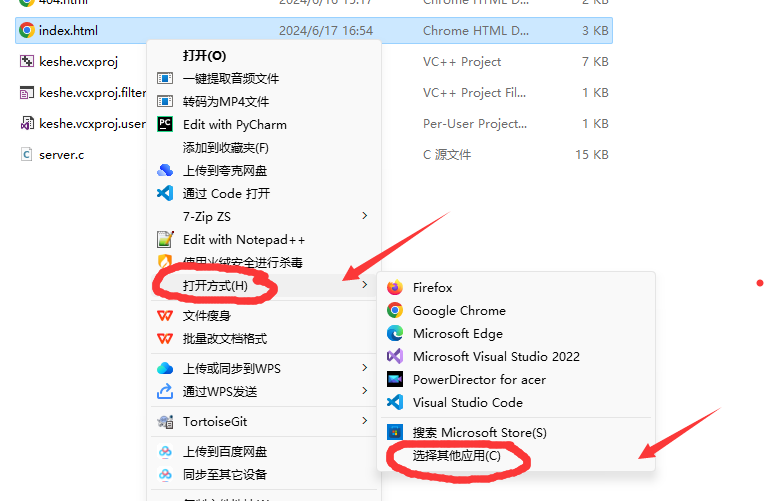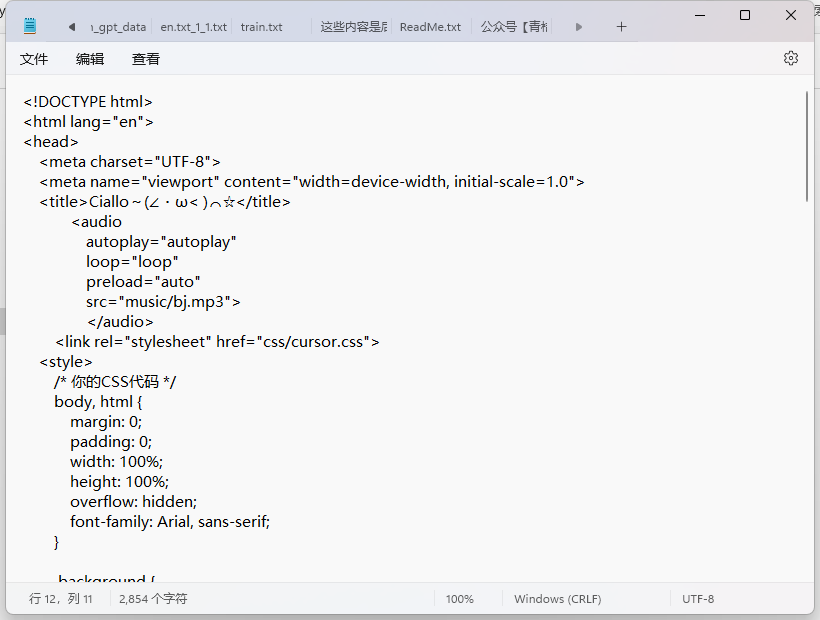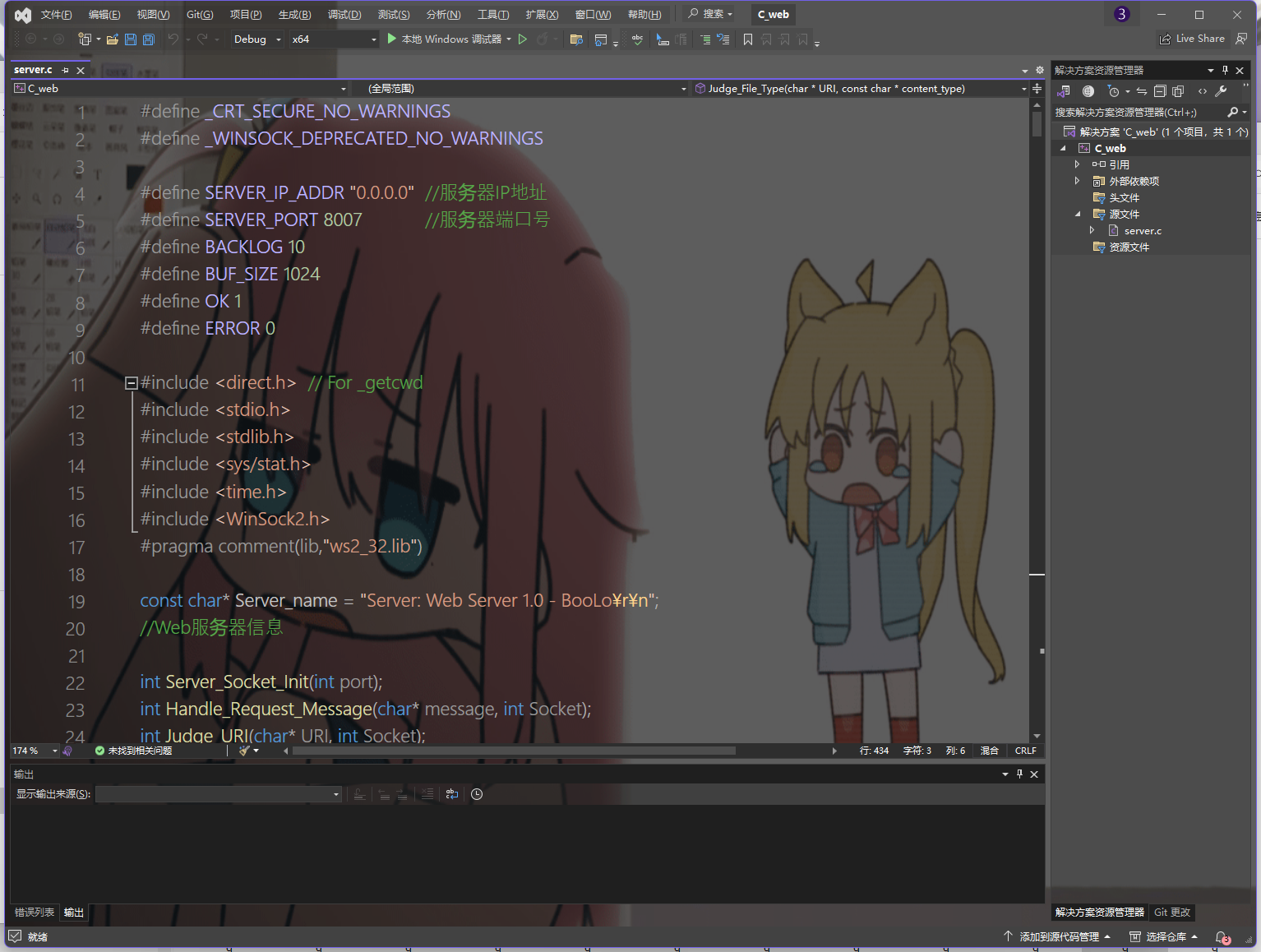本课设任务来自 长江大学计算机网络课设任务四!
运行环境是Visual studio 2022 !
其他的环境请自行测试
本文章也可参考个人博客标准C语言实现简单Web服务器
一、任务要求
设计目标:
完成基础的tcp连接,支持基础的client与其连接 使用fork()来支持并发访问服务器 简单的http访问,支持静态页面访问 支持静态页面访问,需要一定的报错机制,如404页面的建立。
-
socket实现简单Http服务器,完成html的解析;
-
运行该服务器可以通过浏览器访问服务器目录下的 Html文件、jpg图片、css文件的载入。 完成初步的Http服务器功能。
相关技术:
Server端:
1.完成socket(),bind(),listen()这些初始化工作后,调用accept()方法阻塞等待(其实就是进入一个死循环),等待CLient的connect()方法连接 Client端:
2.先调用socket(),然后调用connect()想要与Server端进行连接,这个时候就会进行传说中的TCP三次握手,也就是在Client 发起connect(),并且Server进入accept()阻塞等待时发生三次握手

二、运行截图
终端运行截图:

代码实现效果:


三、代码的配置运行
1、下载地址
首先给出实例代码的下载地址:Ciallo~(∠・ω<)⌒★
提取码: 0721
百度网盘限速也可以看看我gitee上传的代码,地址:Ciallo~(∠・ω<)⌒★
2、代码整体
#define _CRT_SECURE_NO_WARNINGS
#define _WINSOCK_DEPRECATED_NO_WARNINGS
#define SERVER_IP_ADDR "0.0.0.0" //服务器IP地址
#define SERVER_PORT 8007 //服务器端口号
#define BACKLOG 10
#define BUF_SIZE 8192
#define OK 1
#define ERROR 0
#include <direct.h> // For _getcwd
#include <stdio.h>
#include <stdlib.h>
#include <sys/stat.h>
#include <time.h>
#include <WinSock2.h>
#pragma comment(lib,"ws2_32.lib")
const char* Server_name = "Server: Web Server 1.0 - BooLo\r\n";
//Web服务器信息
int Server_Socket_Init(int port);
int Handle_Request_Message(char* message, int Socket);
int Judge_URI(char* URI, int Socket);
int Send_Ifon(int Socket, const char* sendbuf, int Length);
int Error_Request_Method(int Socket);
int Inquire_File(char* URI);
int File_not_Inquire(int Socket);
int Send_File(char* URI, int Socket);
int Logo();
const char* Judge_Method(char* method, int Socket);
const char* Judge_File_Type(char* URI, const char* content_type);
const char* Get_Data(const char* cur_time);
const char* Post_Value(char* message);
int Server_Socket_Init(int port) {
// 初始化和构造套接字
WORD wVersionrequested;
WSADATA wsaData;
SOCKET ServerSock;
struct sockaddr_in ServerAddr;
int rval;
/* 加载Winsock */
wVersionrequested = MAKEWORD(2, 2);
if (WSAStartup(wVersionrequested, &wsaData) != 0) {
printf("Failed to load Winsock!\n");
system("pause");
return -1;
}
printf("Succeed to load Winsock!\n");
/* 创建套接字 */
ServerSock = socket(AF_INET, SOCK_STREAM, IPPROTO_TCP);
if (ServerSock == INVALID_SOCKET) {
printf("Failed to create socket!\n");
system("pause");
exit(1);
}
printf("Succeed to create socket!\n");
/* 配置服务器IP、端口信息 */
memset(&ServerAddr, 0, sizeof(struct sockaddr)); //每一个字节都用0来填充
ServerAddr.sin_family = AF_INET;
ServerAddr.sin_port = htons(port);
ServerAddr.sin_addr.s_addr = inet_addr(SERVER_IP_ADDR);
/* 绑定 */
rval = bind(ServerSock, (SOCKADDR*)&ServerAddr, sizeof(struct sockaddr));
if (rval == SOCKET_ERROR) {
printf("Failed to bind stream socket!\n");
system("pause");
exit(1);
}
printf("Succeed to bind stream socket!\n");
return ServerSock;
}
int Handle_Request_Message(char* message, int Socket) {
//处理HTTP请求报文信息
int rval = 0;
char Method[BUF_SIZE];
char URI[BUF_SIZE];
char Version[BUF_SIZE];
if (sscanf(message, "%s %s %s", Method, URI, Version) != 3) {
printf("Request line error!\n");
return ERROR;
} //提取"请求方法"、"URL"、"HTTP版本"三个关键要素
if (Judge_Method(Method, Socket) == ERROR) {
return ERROR;
}
else if (Judge_Method(Method, Socket) == "POST") {
Post_Value(message);
} //判断处理"请求方法"
// 如果URI是根目录,则将其重定向到 /index.html
if (strcmp(URI, "/") == 0) {
strcpy(URI, "/index.html");
}
if (Judge_URI(URI, Socket) == ERROR) {
return ERROR;
} //判断处理"URI"
else
rval = Send_File(URI, Socket);
if (rval == OK) {
printf("The process is successfully finished!\n");
}
return OK;
}
const char* Judge_Method(char* method, int Socket) {
//判断请求方式
if (strcmp(method, "GET") == 0) {
return "GET";
}
else if (strcmp(method, "POST") == 0) {
return "POST";
}
else {
Error_Request_Method(Socket);
return ERROR;
}
}
int Judge_URI(char* URI, int Socket) {
//判断请求URI
if (Inquire_File(URI) == ERROR) {
File_not_Inquire(Socket);
return ERROR;
}
else
return OK;
}
int Send_Ifon(int Socket, const char* sendbuf, int Length) {
//发送信息到客户端
int sendtotal = 0, bufleft, rval = 0;
bufleft = Length;
while (sendtotal < Length) {
rval = send(Socket, sendbuf + sendtotal, bufleft, 0);
if (rval < 0) {
break;
}
sendtotal += rval;
bufleft -= rval;
}
Length = sendtotal;
return rval < 0 ? ERROR : OK;
}
int Error_Request_Method(int Socket) {
//501 Not Implemented响应
const char* Method_err_line = "HTTP/1.1 501 Not Implemented\r\n";
const char* cur_time = "";
const char* Method_err_type = "Content-type: text/plain\r\n";
const char* File_err_length = "Content-Length: 41\r\n";
const char* Method_err_end = "\r\n";
const char* Method_err_info = "The request method is not yet completed!\n";
printf("The request method from client's request message is not yet completed!\n");
if (Send_Ifon(Socket, Method_err_line, strlen(Method_err_line)) == ERROR) {
printf("Sending method_error_line failed!\n");
return ERROR;
}
if (Send_Ifon(Socket, Server_name, strlen(Server_name)) == ERROR) {
printf("Sending Server_name failed!\n");
return ERROR;
}
cur_time = Get_Data(cur_time);
Send_Ifon(Socket, "Data: ", 6);
if (Send_Ifon(Socket, cur_time, strlen(cur_time)) == ERROR) {
printf("Sending cur_time error!\n");
return ERROR;
}
if (Send_Ifon(Socket, Method_err_type, strlen(Method_err_type)) == ERROR) {
printf("Sending method_error_type failed!\n");
return ERROR;
}
if (Send_Ifon(Socket, Method_err_end, strlen(Method_err_end)) == ERROR) {
printf("Sending method_error_end failed!\n");
return ERROR;
}
if (Send_Ifon(Socket, Method_err_info, strlen(Method_err_info)) == ERROR) {
printf("Sending method_error_info failed!\n");
return ERROR;
}
return OK;
}
int Inquire_File(char* URI) {
// Get the current working directory
char cwd[BUF_SIZE];
if (_getcwd(cwd, sizeof(cwd)) == NULL) {
perror("getcwd() error");
return ERROR;
}
// Construct the absolute path
char abs_path[BUF_SIZE];
snprintf(abs_path, sizeof(abs_path), "%s%s", cwd, URI);
struct stat File_info;
if (stat(abs_path, &File_info) == -1) {
return ERROR;
}
else {
return OK;
}
}
int File_not_Inquire(int Socket) {
const char* File_err_line = "HTTP/1.1 404 Not Found\r\n";
const char* cur_time = "";
const char* File_err_type = "Content-type: text/html\r\n";
const char* File_err_end = "\r\n";
FILE* file;
struct stat file_stat;
char sendbuf[BUF_SIZE];
int send_length;
// Get the current working directory
char cwd[BUF_SIZE];
if (_getcwd(cwd, sizeof(cwd)) == NULL) {
perror("getcwd() error");
return ERROR;
}
// Construct the absolute path to 404.html
char abs_path[BUF_SIZE];
snprintf(abs_path, sizeof(abs_path), "%s\\404.html", cwd);
// Open and read 404.html
file = fopen(abs_path, "rb");
if (file != NULL) {
fstat(_fileno(file), &file_stat);
// Send 404 Not Found response
if (Send_Ifon(Socket, File_err_line, strlen(File_err_line)) == ERROR) {
printf("Sending file_error_line error!\n");
fclose(file);
return ERROR;
}
if (Send_Ifon(Socket, Server_name, strlen(Server_name)) == ERROR) {
printf("Sending Server_name failed!\n");
fclose(file);
return ERROR;
}
cur_time = Get_Data(cur_time);
Send_Ifon(Socket, "Date: ", 6);
if (Send_Ifon(Socket, cur_time, strlen(cur_time)) == ERROR) {
printf("Sending cur_time error!\n");
fclose(file);
return ERROR;
}
if (Send_Ifon(Socket, File_err_type, strlen(File_err_type)) == ERROR) {
printf("Sending file_error_type error!\n");
fclose(file);
return ERROR;
}
// Calculate and send Content-Length
char content_length[BUF_SIZE];
snprintf(content_length, sizeof(content_length), "Content-Length: %lld\r\n", file_stat.st_size);
if (Send_Ifon(Socket, content_length, strlen(content_length)) == ERROR) {
printf("Sending file_error_length error!\n");
fclose(file);
return ERROR;
}
// Send end of header
if (Send_Ifon(Socket, File_err_end, strlen(File_err_end)) == ERROR) {
printf("Sending file_error_end error!\n");
fclose(file);
return ERROR;
}
// Send 404.html content
while ((send_length = fread(sendbuf, 1, BUF_SIZE, file)) > 0) {
if (Send_Ifon(Socket, sendbuf, send_length) == ERROR) {
printf("Sending 404.html content error!\n");
break;
}
}
fclose(file);
} else {
printf("Failed to open 404.html!\n");
return ERROR;
}
return OK;
}
int Send_File(char* URI, int Socket) {
char cwd[BUF_SIZE];
if (_getcwd(cwd, sizeof(cwd)) == NULL) {
perror("getcwd() error");
return ERROR;
}
char abs_path[BUF_SIZE];
snprintf(abs_path, sizeof(abs_path), "%s%s", cwd, URI);
// 200 OK响应
const char* File_ok_line = "HTTP/1.1 200 OK\r\n";
const char* cur_time = "";
const char* File_ok_type = "";
const char* File_ok_length = "Content-Length: ";
const char* File_ok_end = "\r\n";
FILE* file;
struct stat file_stat;
char Length[BUF_SIZE];
char sendbuf[BUF_SIZE];
int send_length;
if (Judge_File_Type(abs_path, File_ok_type) == ERROR) {
printf("The request file's type from client's request message is error!\n");
return ERROR;
}
file = fopen(abs_path, "rb");
if (file != NULL) {
fstat(_fileno(file), &file_stat);
_itoa(file_stat.st_size, Length, 10);
if (Send_Ifon(Socket, File_ok_line, strlen(File_ok_line)) == ERROR) {
printf("Sending file_ok_line error!\n");
return ERROR;
}
if (Send_Ifon(Socket, Server_name, strlen(Server_name)) == ERROR) {
printf("Sending Server_name failed!\n");
return ERROR;
}
cur_time = Get_Data(cur_time);
Send_Ifon(Socket, "Date: ", 6);
if (Send_Ifon(Socket, cur_time, strlen(cur_time)) == ERROR) {
printf("Sending cur_time error!\n");
return ERROR;
}
File_ok_type = Judge_File_Type(abs_path, File_ok_type);
if (Send_Ifon(Socket, File_ok_type, strlen(File_ok_type)) == ERROR) {
printf("Sending file_ok_type error!\n");
return ERROR;
}
if (Send_Ifon(Socket, File_ok_length, strlen(File_ok_length)) != ERROR) {
if (Send_Ifon(Socket, Length, strlen(Length)) != ERROR) {
if (Send_Ifon(Socket, "\n", 1) == ERROR) {
printf("Sending file_ok_length error!\n");
return ERROR;
}
}
}
if (Send_Ifon(Socket, File_ok_end, strlen(File_ok_end)) == ERROR) {
printf("Sending file_ok_end error!\n");
return ERROR;
}
while (file_stat.st_size > 0) {
if (file_stat.st_size < 1024) {
send_length = fread(sendbuf, 1, file_stat.st_size, file);
if (Send_Ifon(Socket, sendbuf, send_length) == ERROR) {
printf("Sending file information error!\n");
continue;
}
file_stat.st_size = 0;
}
else {
send_length = fread(sendbuf, 1, 1024, file);
if (Send_Ifon(Socket, sendbuf, send_length) == ERROR) {
printf("Sending file information error!\n");
continue;
}
file_stat.st_size -= 1024;
}
}
}
else {
printf("The file is NULL!\n");
return ERROR;
}
return OK;
}
const char* Judge_File_Type(char* URI, const char* content_type) {
//文件类型判断
const char* suffix;
if ((suffix = strrchr(URI, '.')) != NULL)
suffix = suffix + 1;
if (strcmp(suffix, "html") == 0) {
return content_type = "Content-type: text/html\r\n";
}
else if (strcmp(suffix, "jpg") == 0) {
return content_type = "Content-type: image/jpg\r\n";
}
else if (strcmp(suffix, "png") == 0) {
return content_type = "Content-type: image/png\r\n";
}
else if (strcmp(suffix, "gif") == 0) {
return content_type = "Content-type: image/gif\r\n";
}
else if (strcmp(suffix, "txt") == 0) {
return content_type = "Content-type: text/plain\r\n";
}
else if (strcmp(suffix, "xml") == 0) {
return content_type = "Content-type: text/xml\r\n";
}
else if (strcmp(suffix, "rtf") == 0) {
return content_type = "Content-type: text/rtf\r\n";
}
else if (strcmp(suffix, "js") == 0) { // 添加对js文件的支持
return content_type = "Content-type: application/javascript\r\n";
}
else if (strcmp(suffix, "css") == 0) { // 添加对css文件的支持
return content_type = "Content-type: text/css\r\n";
}
else if (strstr(URI, ".mp3") != NULL) {
content_type = "Content-Type: audio/mpeg\r\n";
}
else
return ERROR;
}
const char* Get_Data(const char* cur_time) {
//获取Web服务器的当前时间作为响应时间
time_t curtime;
time(&curtime);
cur_time = ctime(&curtime);
return cur_time;
}
const char* Post_Value(char* message) {
//获取客户端POST请求方式的值
const char* suffix;
if ((suffix = strrchr(message, '\n')) != NULL)
suffix = suffix + 1;
printf("\n\nPost Value: %s\n\n", suffix);
return suffix;
}
int Logo() {
//Web服务器标志信息
printf("/ ̄ ̄ ̄ ̄ ̄ ̄ ̄ ̄ ̄\n");
printf("| 程序启动了!\n");
printf("\\n");
printf("  ̄ ̄∨ ̄ ̄ ̄ ̄ ̄ ̄\n");
printf(" ∧_∧\n");
printf(" ( ∧_∧) \n");
printf(" ( つつヾ\n");
printf(" | | |\n");
printf(" (__)_)\n");
printf("\n");
printf("___________________________________________________________\n\n");
return OK;
}
int main(int argc, char* argv[]) {
// 默认端口号
int port = SERVER_PORT;
// 如果通过命令行传入端口号,则使用该端口号
if (argc == 2) {
port = atoi(argv[1]);
}
// 初始化服务器套接字
SOCKET ServerSock, MessageSock;
struct sockaddr_in ClientAddr;
int rval, Length;
char revbuf[BUF_SIZE];
Logo();
printf("Web Server is starting on port %d...\n\n", port);
ServerSock = Server_Socket_Init(port);
printf("\n-----------------------------------------------------------\n");
while (OK) {
/* 启动监听 */
rval = listen(ServerSock, BACKLOG);
if (rval == SOCKET_ERROR) {
printf("Failed to listen socket!\n");
system("pause");
exit(1);
}
printf("Listening the socket on port %d...\n", port);
/* 接受客户端请求建立连接 */
Length = sizeof(struct sockaddr);
MessageSock = accept(ServerSock, (SOCKADDR*)&ClientAddr, &Length);
if (MessageSock == INVALID_SOCKET) {
printf("Failed to accept connection from client!\n");
system("pause");
exit(1);
}
printf("Succeed to accept connection from [%s:%d] !\n\n", inet_ntoa(ClientAddr.sin_addr), ntohs(ClientAddr.sin_port));
/* 接收客户端请求数据 */
memset(revbuf, 0, BUF_SIZE); //每一个字节都用0来填充
rval = recv(MessageSock, revbuf, BUF_SIZE, 0);
revbuf[rval] = 0x00;
if (rval <= 0)
printf("Failed to receive request message from client!\n");
else {
printf("%s\n", revbuf); //输出请求数据内容
rval = Handle_Request_Message(revbuf, MessageSock);
}
closesocket(MessageSock);
printf("\n-----------------------------------------------------------\n");
}
closesocket(ServerSock); //关闭套接字
WSACleanup(); //停止Winsock
return OK;
}
3、代码配置

因为根据任务书要求,每个人的代码要有自己的信息,下面将教大家如何更改代码的一些内容然后变为自己的课设!
(1)如何更改端口?
将整体代码的第5行更改为自己的端口号,为下面我注释的地方
#define _CRT_SECURE_NO_WARNINGS
#define _WINSOCK_DEPRECATED_NO_WARNINGS
#define SERVER_IP_ADDR "0.0.0.0"
#define SERVER_PORT 8007 // --》 请更改为你自己的端口
#define BACKLOG 10
#define BUF_SIZE 1024
#define OK 1
#define ERROR 0
(2)如何更改姓名?
请解压上面下载地址的压缩包,然后进入解压后的文件夹,并且点击keshe这个文件夹

注: 解压不会的请看下面教程
本人非常推荐7zip,当然你也可以用自己电脑内置的解压
【分享】7-Zip解压缩软件的超详细使用攻略_7zip使用教程-CSDN博客

鼠标右键点开这个index.html,并且选择用文本编辑器进行打开,你可以使用vscode,也可以用notepad++,因为大部分人可能没有,所以我教你们用windows内置的记事本打开
请依次按照我的箭头点击!!!

会弹出下面的窗口,如果你已经看到了电脑的记事本你就直接点击并且点击下面的仅一次,如果出现我下面的情况没有看到,请滑动鼠标滚轮查找


点击下面右边的仅一次即可进入记事本界面,可以修改html代码了!

然后请把文本用滚轮翻到最底部,也就是出现中文的地方!!!
然后修改你的姓名这段内容,然后就可以变成你的名字了

(3)额外配置 (可选)
3.1、如何更改背景音乐并且生效?
修改keshe文件夹下(就是刚刚存储index.html的目录)music文件夹里面的mp3文件,mp3可以更换你喜欢的音乐
一个是404页面的背景音乐,一个是主页的背景音乐

因为我这个是弄的打开页面自动播放,如果你用的edge浏览器请打开媒体自动播放
请参考右边的链接教程:如何使用edge浏览器开启网站的媒体自动播放权限-百度经验 (baidu.com)
3.2、如何更改背景图和404图并且生效?
修改keshe文件夹下(就是刚刚存储index.html的目录)img文件夹里面的gif文件,使用gif图片是因为有动态效果,但是网页加载就会很卡,如果你想使用其他的背景图,如jpg和png都行,不过还是要回到前面更改index.html步骤进行更改对应的文件名称

如果更改了图片的名称和格式,请重新按照(2)如何更改姓名 的步骤打开index.html文件和404.html,然后更改


4、代码运行
先提前装好visual studio 2022环境,具体教程可以看看下面
编程小白必看!Visual Studio 2022详细安装使用教程(C/C++编译器)-CSDN博客
然后点击解压好文件点击解压之后文件夹里面的C_web.sln然后将会进入VS2022的界面里面

同时按下键盘的CTRL和F5然后就会运行项目

然后打开Edge浏览器或者什么其他浏览器都行
输入下面的地址,然后回车
127.0.0.1:{你输入的端口号}

中间的三个文字也是按钮,如果点击计算机网络课设和你的姓名将会弹出Ciallo~(∠・ω<)⌒★,如果点击Ciallo~(∠・ω<)⌒★这个按钮的话将会进入404报错页面
























 482
482

 被折叠的 条评论
为什么被折叠?
被折叠的 条评论
为什么被折叠?








